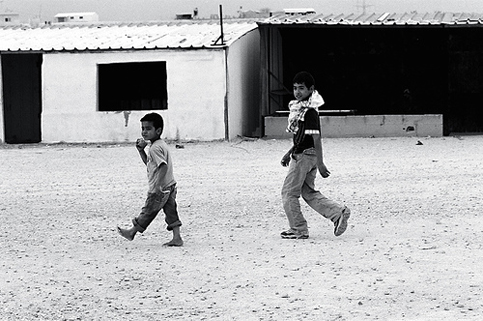- the Guardian: Neve Gordon and Erez Tzfadia.

- Photo: Wadi al-Naam, unrecognized Negev, Bedouin Village, February 2006.
Increasingly, Israel is handing over its ‘Judaisation’ project to private firms
– leading to a corrosion of accountability…
For less than four dollars an hour, the Jewish teenagers removed furniture, clothes, kitchenware and toys from the homes and loaded them on to trucks. As they worked diligently alongside the many policemen who had come to secure the destruction of 30 houses in two unrecognised Bedouin villages, Bedouin teenagers stood by watching their homes being emptied.
When all the belongings had been removed, the bulldozers rapidly destroyed the homes. All those present, Jews and Bedouins, were Israeli citizens; together they learned an important lesson in the discrimination characterising civic life in the Jewish state.
The current demolitions are part of a strategy that began with the foundation of the state of Israel. Its ultimate objective is the Judaisation of space. In this case, the demolitions were carried out in order to establish two new Jewish villages. Their establishment, though, is part of a much larger plan that includes the construction of about 30 new Jewish settlements in the Israeli Negev, the seizure of Bedouin land for military needs, and the creation of dozens of single-family farms on land that has been inhabited by Bedouins since they were relocated to the region by the state in the early 1950s.
After witnessing the demolitions, a Bedouin activist asked one of the Jewish teenagers why he had agreed to participate in the eviction. Without hesitating, the teenager replied: “I am a Zionist and what we are doing here today is Zionism.”
The teenager was not wrong. And yet he was probably too young to recognise that even though Zionism’s major goals have not changed, the methods deployed to realise them have been undergoing a radical transformation. While, traditionally, the state itself performed the task of Judiasing space, over the years the government has been outsourcing more and more of its responsibilities to private firms. The teenager himself was hired by a personnel agency, which was employed by the state to carry out the job of expelling Bedouins from their homes.
The process of privatising Zionism has been slow. For over five decades the state was the sole agent responsible for all planning of new villages, towns and cities, and only the construction was carried out by private contractors. Now, land from which the Bedouins are being expelled is sold at rock bottom prices to big real estate moguls, who are then responsible not only for building Jewish villages and towns, but also for planning them. The private contractors manage to garner larger returns than ever before, since the difference in price between “unplanned” land and land that has undergone “planning” is enormous.
The personnel agencies and contractors are, however, not the only heroes in the crusade to privatise Zionism. A five-minute drive separates the two unrecognised Bedouin villages whose houses were demolished from a number of single-family Jewish farms established in the last few years. The state gives these Jewish farmers large plots of land and connects them to basic infrastructure like water and electricity, and, in return, expects them to be part of an apparatus whose role is to contract and restrict Bedouin movement and development and to help the security forces keep an eye on the Negev’s indigenous population.
If one drives a few kilometres further and crosses the Green Line into the occupied Palestinian territories, one may notice that military checkpoints are also being privatised. In the past year, at least five such checkpoints have been handed over to subcontractors and are currently managed by corporate warriors. The difference between IDF soldiers and corporate warriors is that the latter operate within the gray areas of the law. They are Israel’s Blackwater. Thus, as this privatising trend continues the checkpoints in the West Bank, which have already earned notoriety under the management of the Israeli military, will surely become sites of more misery for Palestinians trying to pass through.
The checkpoints, though, are just a recent development in a process that has been going on for several years in the occupied territories. In the early 1980s, the Israeli government allowed private contractors to appropriate land within the occupied territories and sell it at great profits, while the military created settler militias to help it police the Palestinian inhabitants. These civilian militias were given military-issue personnel carriers, weapons, and communications equipment and were asked to patrol around their settlements, which, in practice, often meant policing nearby Palestinian villages.
Zionism’s privatisation does not symbolise a strategic change but rather a tactical one. The state has been shedding some of its responsibility, while private entities have been taking on the tasks that until recently had been carried out by the government. The major difference is that the private firms are even less liable than the state. Hence, the use of teenagers to evict Bedouins from their homes is not only a reflection of this insidious process of privatisation, but also the unrelenting corrosion of moral accountability.


